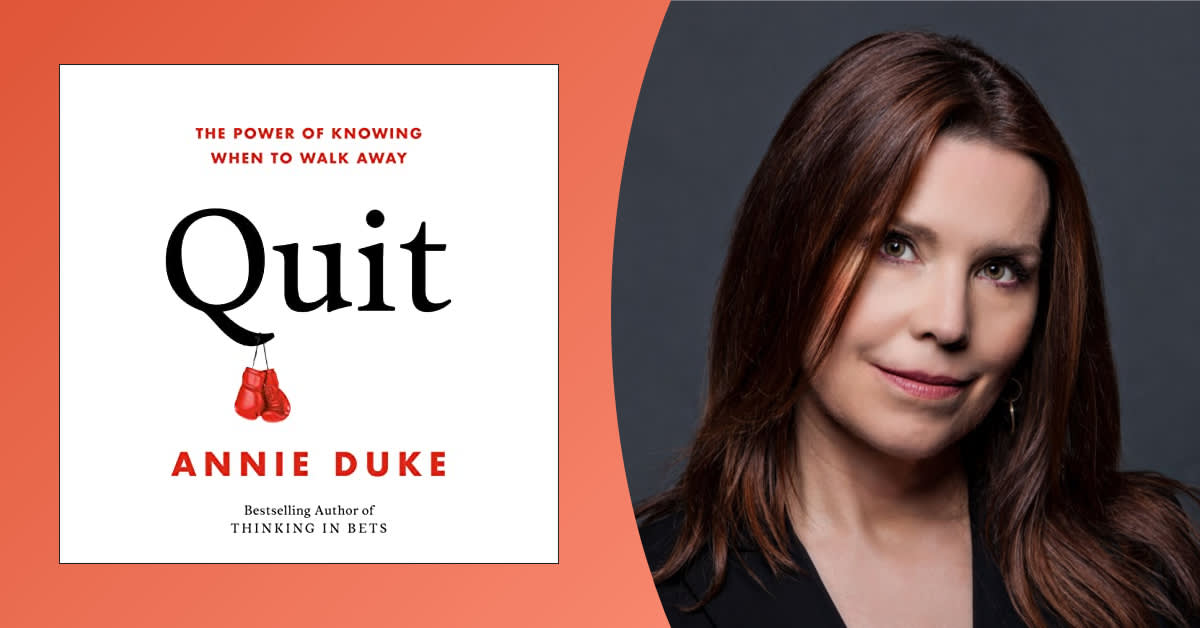Even following the great resignation, quitting still gets a bad rap. With headlines about “quiet quitting” recently flooding our feeds, media outlets and employers are sending the message that it’s shameful to quit—even if our jobs are making us miserable.
Counteracting this message is professional poker player and bestselling author Annie Duke. In her latest business listen, Quit, Duke makes the case for cutting ties in order to commit to better opportunities. In this brief Q&A, Duke shares what inspired her to write Quit, why we have a stigma around quitting, and what we stand to gain when we “give up.”
Audible: You've written two other quintessential business books, Thinking in Bets and How to Decide. What made you want to write about quitting now?
Annie Duke: In my previous book, How to Decide, I wrote a very short section about the value of having the option to quit because of the challenge of making decisions when we have incomplete information and can’t see into the future. We’ve all had that feeling of, “I wish I knew then what I know now!” That’s the feeling of realizing how little information we had when we made an earlier decision. Quitting is the skill that lets us react to that new information, because when we find those new things out, we have the option to change our minds. Even though that section was only about a page and a half, I found myself obsessed with the topic. It was all I wanted to talk about! It was then I knew I wanted to write Quit.
There’s something very counterintuitive about the idea that quitting can be a good thing. I thought it would be fun and challenging to take a deep dive into quitting. I started tapping into scientific work on the subject, so many different disciplines, so many different perspectives. And the deeper I got, the deeper I wanted to go.
Hopefully, people who listen to Quit will come away understanding that winners quit a lot. That’s why they win.
Why is there a stigma around quitting?
What’s the most famous, widely disseminated advice of successful people? It’s some version of “Quitters never win, and winners never quit.” Thomas Edison, Conrad Hilton, Babe Ruth, Vince Lombardi, Michael Jordan, Ted Turner. In every age, that’s the message that gets passed on.
That negative image weighs on us, especially because the moment you quit is when you go from failing to having failed. If you’ve started something that isn’t going as you had hoped, as long as you keep at it, there is always some chance you can turn it around. But if you choose to quit, that is the moment that success is out of reach. That makes it really hard to quit before you know for sure there is no other choice. Of course, when you are certain there is no choice but to quit, that is usually too late.
We think failure is a bad thing. And if failure is a bad thing, then quitting must be also because the moment you quit is the moment the possibility of turning it around is gone.
“Contrary to popular belief, quitting will get us to where we want to go faster.”
What do we stand to gain when we quit?
Contrary to popular belief, quitting will get us to where we want to go faster. We are reluctant to walk away when we should because we have the feeling that doing so will slow our progress or stop it altogether. But the reverse is actually true.
If you stick to a path that is no longer worth pursuing, whether it’s a relationship that isn’t going well, a stock you’re invested in that’s losing money, or an employee you’ve hired who isn’t performing, that is when you lose ground. Sticking to something that isn’t worth it because you think that gritting it out shows character prevents you from switching to something better.
Anytime you stay mired in a losing endeavor, that is when you are slowing your progress. Anytime you stick to something when there are better opportunities out there, that is when you are slowing your progress. And that is why quitting gets us to where we want to go faster.





